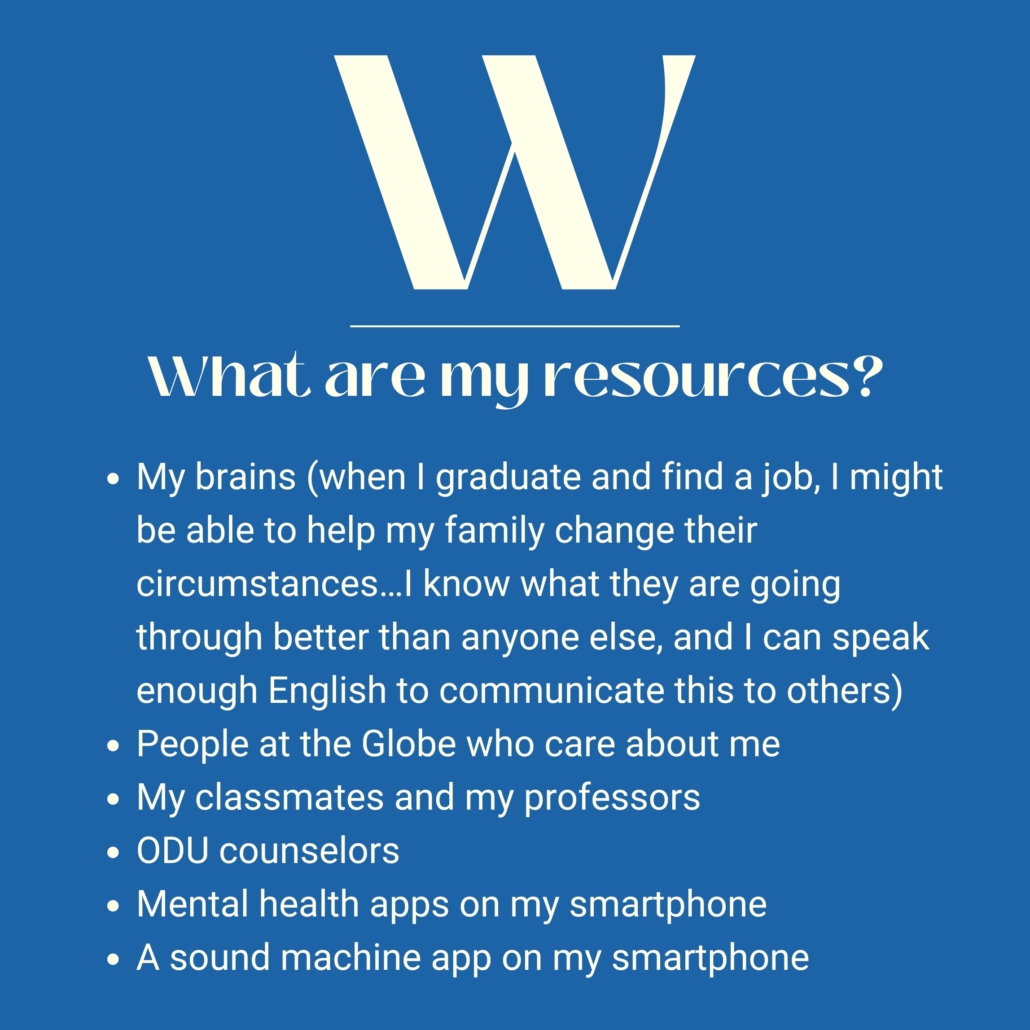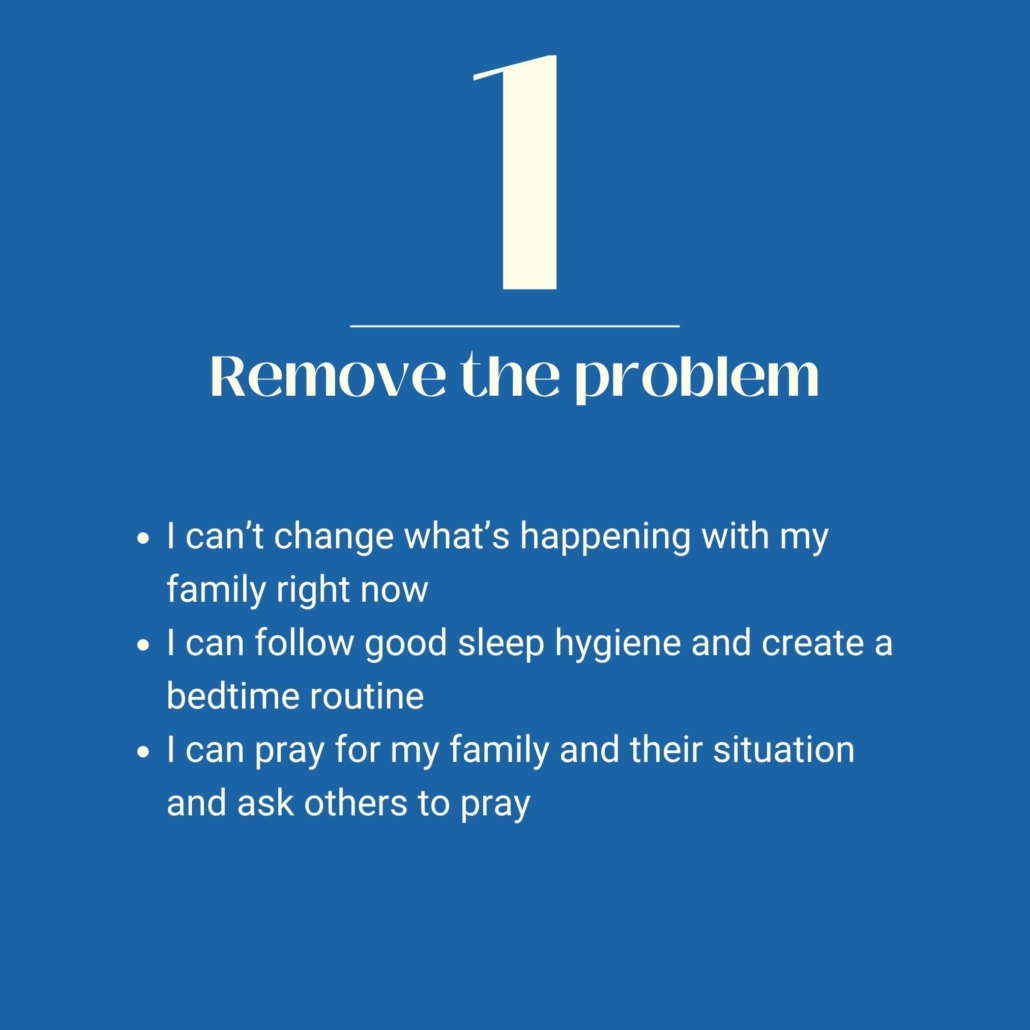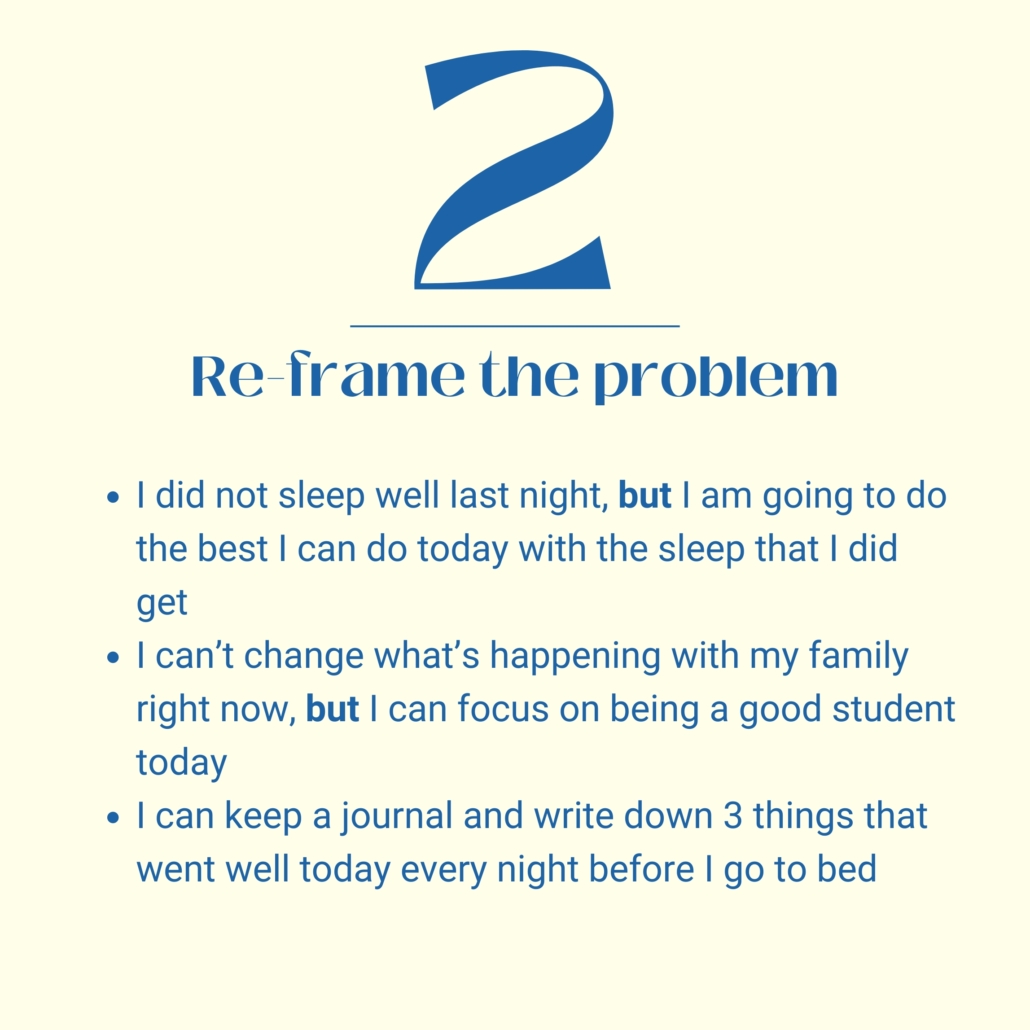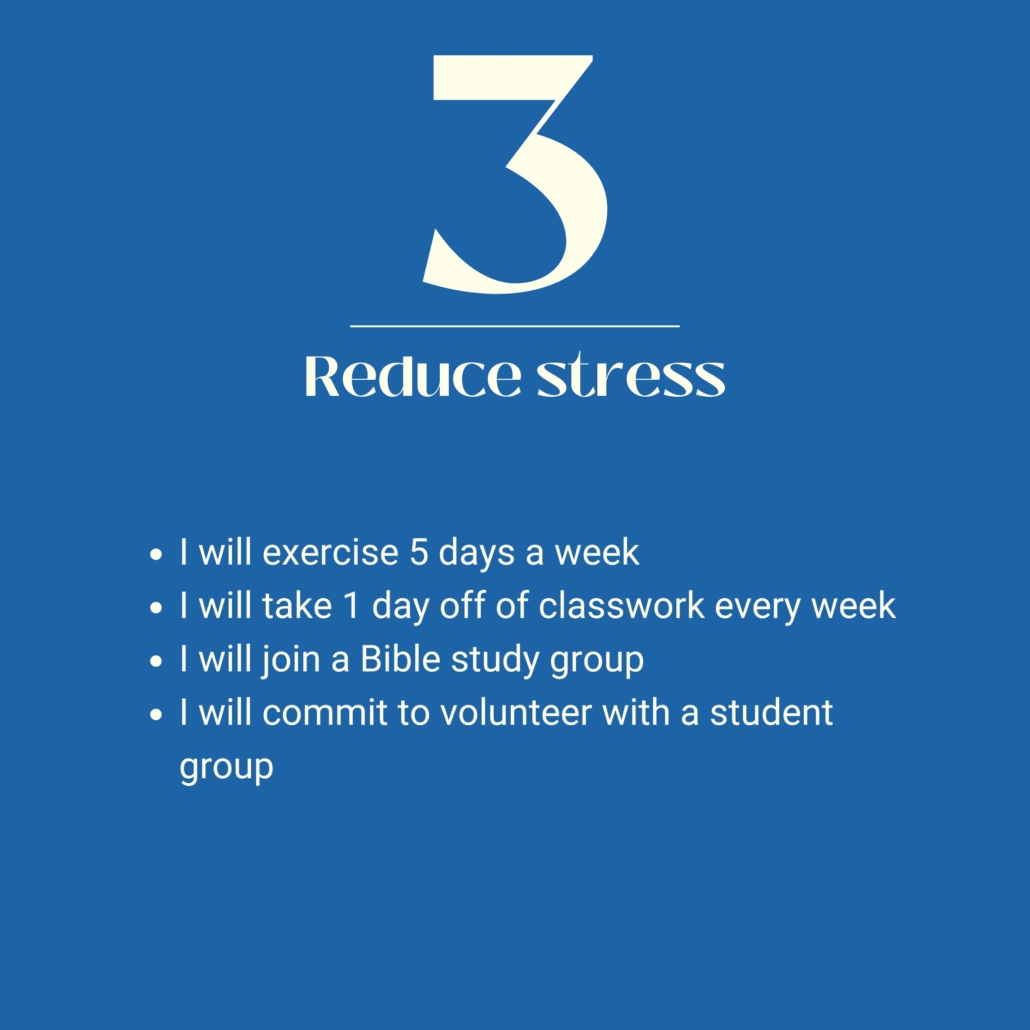Stress Resources
How do you have peace when there is no peace?

- Resources (Counselors and Apps)
- Dealing With Stress (www.123 Method)
- More Practical Tips
- Forgiveness
- When Stress is From Trauma
- The Ultimate Peace
None of the resources on this site are meant to take the place of professional psychological diagnosis, advice, or care.

Visit a counselor
A counselor will listen to what is going on and encourage you how to move forward. We all need someone to listen to us, especially when we are stressed!
- ODU Counseling – Free for ODU students.
- Regent Counseling – Open to non-Regent students. The price is based off the client’s ability to pay (some clients pay as low as $1/session), and is free for Regent students (after intake). You might find a counselor here who knows what it’s like to be an international student!
- Norfolk State Counseling – For NSU students. They also have telehealth counseling.
- Global Counseling Network – Online counseling from a Christian perspective.
- Online-therapy.com – Online counseling
Apps
These free apps are good resources for overcoming stress:
- 7 Cups – Free, trained listeners. Over 25 languages available. Anonymous.
- PTSD Family Coach – Learn how to help loved ones who have trauma. Includes how to take care of yourself and your relationship.
- CBT-I Coach – Help for insomnia and sleeping problems.
- Finch – Grow a virtual pet through self-care (includes in-app purchases).
Dealing With Stress – The www.123 Method:
Use this method when you’re feeling stressed. Start by asking yourself:
What is the problem?
- What is making me feel stressed? Is there more than one problem?
- Is this really the problem or is there something else behind it?
- Is this a real threat? {Would I react the same if there was a wild tiger in the room with me = a true threat}
What are my resources?
- Internal resources (personal strengths, skill, experience)
- External resources (friends, counselors, mental health apps, people who will pray for you, the environment, apps, books, money…)
What can I do?
- What can I control? (my attitude, personal preparation, self-care…)
- What can I not control? (the weather, actions of nations, what other people do…)
One – Remove the problem causing the stress. Not always possible!
Two – Re-frame – or re-interpret – the problem so that it does not cause stress in your mind and body.
Three – Decrease your stress and focus on self-care. Take away stress’ power! See ways to do this this in the More Practical Tips section.

Resource adapted from: Williams AM, Williams NJ. Using a cognitive framework with nurses to manage stress. J Eval Clin Pract. 2023;29(2):282-291. doi:10.1111/jep.13763
Example:







These activities help relieve personal stress:
ABC: Act – Belong – Commit1
Act
- Perform self-care (get enough sleep, rest one day a week, exercise, etc.)
- Keep a thankfulness journal (write down 3 things you are grateful for before you go to bed every night)
- List the good points and bad points of living back home and then the good and bad points of living in the US. How would you like to move forward?
- Focus on truth (write out something you want to focus on and carry it with you throughout the day or put it in a place where you will see it often.)
- Pick 1 true thing to focus on all day. (Truths to get you started: You are loved. You are valuable. Your life is making a difference.)
- Faith-based: focus on God’s word – put his truth into your mind and focus on that (these 10 verses are a great place to start).
- Faith-based: spend time singing songs to God. The Bible says that in God’s presence “is fullness of joy” (Psalm 16:11; NKJV).
Belong
- Join a group – community is very important for overcoming stress2,3 (this can be an informal group of friends or something more formal like a Bible study or student organization)
- Find people who will listen to you
Commit
- Volunteer regularly to help others
- Work to reach a personal goal (like running a 5k)
1. Adapted from: Williams AM, Williams NJ. Using a cognitive framework with nurses to manage stress. J Eval Clin Pract. 2023;29(2):282-291. doi:10.1111/jep.13763
2. Venniro M, Zhang M, Caprioli D, et al. Volitional social interaction prevents drug addiction in rat models. Nat Neurosci. 2018;21(11):1520-1529. doi:10.1038/s41593-018-0246-6
3. Scheuplein M, van Harmelen AL. The importance of friendships in reducing brain responses to stress in adolescents exposed to childhood adversity: a preregistered systematic review. Curr Opin Psychol. 2022;45:101310. doi:10.1016/j.copsyc.2022.101310
forgiveness /fər-gĭv′nĭs, fôr-/ a conscious, deliberate decision to release feelings of resentment or vengeance toward a person or group who has harmed you, regardless of whether they actually deserve your forgiveness.
What would you do to
the murderer
of your mother?
- Dr. Worthington had been a counselor for years when his mother was murdered. Spiraling from the murder, his brother committed suicide…Dr. Worthington had every right to be angry and get revenge. Instead, he dedicated his life’s work to the research of forgiveness.
- Dr. Worthington’s site has several, free, evidence-based workbooks you can go through on your own to help you forgive others and yourself.
- This isn’t easy…but it’s worth it.
- Research is showing that forgiveness leads to mental and physical health but not forgiving others can cause anxiety and depression.1

1. Singh AK, Tiwari GK, Rai PK. Beyond “cold emotion and rumination”: a qualitative study on the nature and attributes of unforgiveness. European Journal of Psychology Open. 2022;81(2):57–70. doi:10.1024/2673-8627/a000026

When Stress is From Trauma
What is trauma? Straussner and Calnan1 define trauma as “an experience that is emotionally painful, distressful, or shocking.” Examples can include witnessing a death or experiencing violence, abuse, natural disasters, or even constant bullying. What can you do if you are dealing with trauma?
First, we at the Globe want to say we are sorry. We are sorry for what you have experienced. It breaks our hearts to see the hurt you carry.
Second, take time to process and grieve your experience and what you have lost.
Third, find safe people who are good listeners (and will not gossip) and tell them what you have experienced. This might be a counselor.
Other things you can do:
- Journal (write about what you experienced; write what you are thinking and feeling now)
- Do something to commemorate (to honor and remember) what or who you lost. It’s okay if you are the only person who knows what it means: plant a tree, write a poem, paint a picture, write a song…
- Pray – tell God what is in your heart, what you are thinking, and how you are feeling (even how you are feeling about him). Be completely honest and don’t hold anything back. He knows it all anyway, so you don’t have to be polite.
1. Straussner SLA, Calnan AJ. Trauma through the life cycle: a review of current literature. Clin Soc Work J. 2014;42:323–335. doi:10.1007/s10615-014-0496-z
How do I have peace when there is no peace?
The Globe staff believe there is a way to have ultimate peace.
“O man greatly beloved, fear not! Peace be to you; be strong, yes, be strong!” | Daniel 10:19 (NKJV)
In the Bible, Jesus promised his followers that they would have trouble in the world (John 16:33). Stress, trouble, and trauma are part of living in our world. But that’s not all the Bible says. It also says:
The Lord is near to those who have a broken heart. | Psalm 34:18 (NKJV)
You number my wanderings; put my tears into Your bottle; are they not in Your book? …God is for me. | Psalm 56:8-9 (NKJV)
He heals those who have broken hearts. He takes care of their wounds. | Psalm 147:3 (NIRV)
God knows your stress and your trauma. He knows what you are going through, and he wants you to talk to him and tell him your stories. He collects your tears in his bottle and numbers your travels. He loves you.
Jesus said: Here I am! I stand at the door and knock. If anyone hears my voice and opens the door, I will come in. I will eat with that person, and they will eat with me (Revelation 3:20; NIRV). Jesus is waiting to come in and be with you, to hear your stories and talk with you. Will you invite him in?
Any Globe staff member would be happy to talk more about this with you.

Scripture quotations marked (NKJV) are taken from the New King James Version®. Copyright © 1982 by Thomas Nelson. Used by permission. All rights reserved.
Scripture quotations marked (NIrV) are taken from the Holy Bible, New International Reader’s Version®, NIrV® Copyright © 1995, 1996, 1998, 2014 by Biblica, Inc.™ Used by permission of Zondervan. All rights reserved worldwide. www.zondervan.comThe “NIrV” and “New International Reader’s Version” are trademarks registered in the United States Patent and Trademark Office by Biblica, Inc.™
